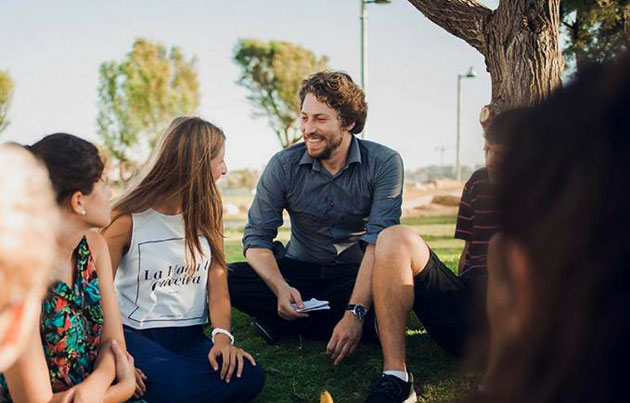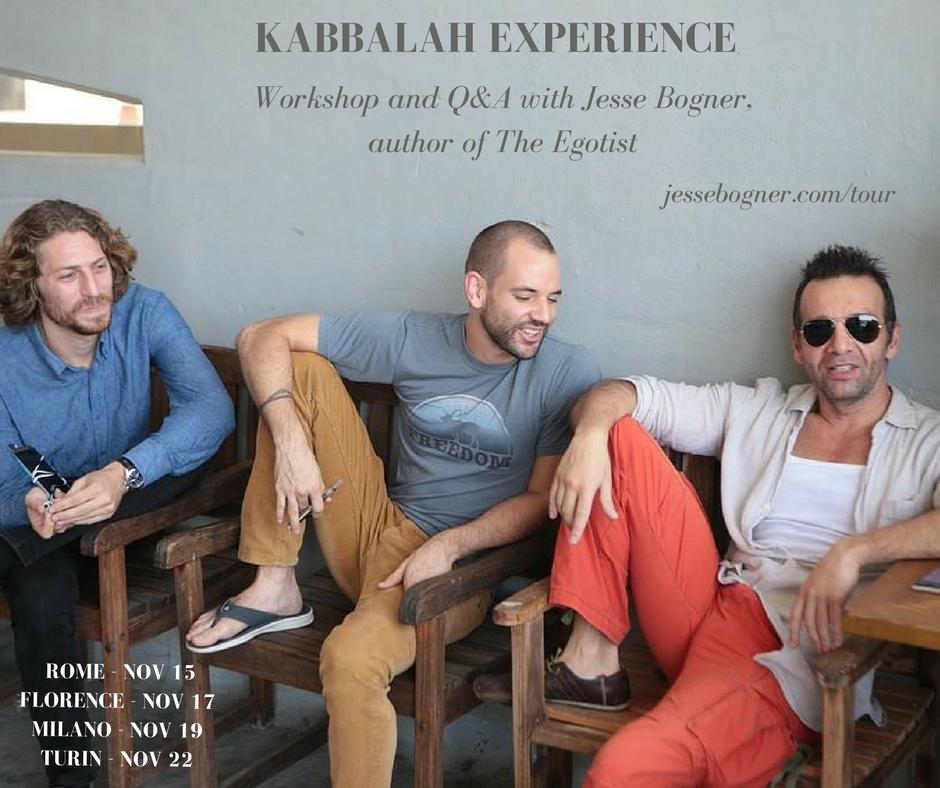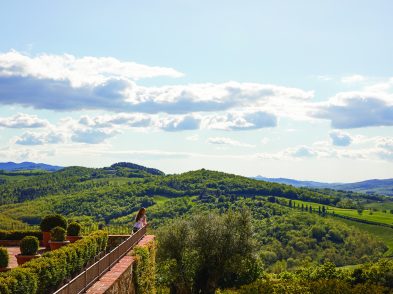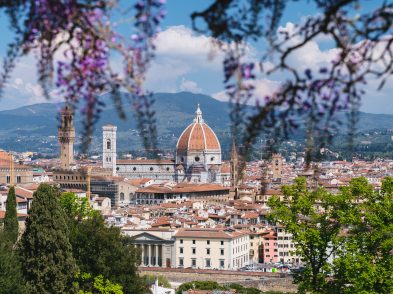Jesse Bogner is a 29-year-old author, screenwriter and journalist who moved from New York, where he was born and raised, abandoning a decadent lifestyle of substance abuse, to study Kabbalah in Israel. Now he’s in Florence, where his family lives, to promote his memoir, The Egotist. The Florentine speaks to him about his life, book and visit to the Renaissance city.
The Florentine: Jesse, you left a hedonistic lifestyle in New York to seek a new life in Israel. Can you tell us about the inspiration behind your book The Egotist?
Jesse Bogner: In 2013, the world’s foremost expert on Kabbalah, Michael Laitman, presented me with an opportunity to edit his book Like a Bundle of Reeds, on the causes and history of anti-Semitism, just as I was getting sober. I became so absorbed in the material, that I read six books on the subject. I ended up changing the tone and style of Laitman’s book a lot. Though he and his publishing company liked the direction I took, Laitman used very little of my work, and instead he asked me to move to Israel for six months to write my own book. I’ve been in Israel over three years now.
For some reason that defies all rationale, less than two months into my sobriety, I felt compelled to make the move and responded “Yes,” without hesitation. It turned out to be the best decision of my life. I was depressed and spiritually dead. Though I had great friends, some of whom objectively are among the greatest known and unknown young artists of our time, I felt a futility in what I was doing trying to get two movies I co-wrote made. I thought they would make very good, possibly great movies, but I like many people in our troubled times, found myself looking for a deeper meaning and purpose to our existence that I found in Kabbalah.
When I started The Egotist, I wanted to do something very simple and straightforward that explained Kabbalah and offered a Kabbalistic take on the world crisis in all spheres of society. Then, as I began to study the wisdom with a group of four hundred Israeli students on a nearly daily basis, first from the side and then very seriously, I began to experience this overwhelming, life-affirming emotional rollercoaster.
Though I was generally a pretty private person, it became clear to me early on that the book needed to include these experiences. I felt that if I could communicate honestly how my perspective was changing and express the love I was feeling, pulling me through very trying times, it would transcend any esoteric explanation of what Kabbalah is and connect with others who were suffering. I wrote the book very quickly in an informal style that shifts tenses to address the reader directly. I wanted the reader to feel like they were communicating with me, undergoing their own spiritual process as they read the book.
The Florentine: You’ve spoken about the meaning of life through Kabbalah in Israel and now in Europe. How does the audience and response vary?
JB: In Israel everyone knows what Kabbalah is. However, there is this misconception implanted by the Orthodox Jews that Kabbalah is mysticism and very dangerous to study, unless you are a married man over the age of forty who has committed to memory many difficult Jewish holy books. Even many open-minded secular people with an interest in similar Eastern belief systems have an irrational fear about the study of Kabbalah.
However, when I speak to people in Israel and explain the meaning of Kabbalah, they love it, for a lot of reasons, but I believe particularly because it mirrors a lot of the ideas about unity that the founders of Israel built the kibbutz movement with. I have found that American and European audiences, who usually only know Kabbalah as something Madonna and a lot of other celebrities are involved in, are much more open-minded. Generally I have found that all audiences with the exception of philosophers, some scientists and deeply religious people find something meaningful in the wisdom of Kabbalah.
It’s really difficult to connect with an audience that is married to a particular belief system or ideology, because in those instances, our presentation becomes an argument, or an intellectual exercise, instead of an emotional experience. This is particularly true of religious people, because when we say the stories of The Bible aren’t factual, but deeply spiritual parables about how humanity needs to achieve connection, their whole worldview is shaken. Scientists and philosophers tend to dismiss it before I start talking. However, even when contrarians make an effort to connect with others in our lectures, they feel connected to a power much larger than their own ego, maybe more so than the typical lecture guest.
The Florentine: What is Kabbalah?
JB: Kabbalah is the study of the forces that operate our world and a hidden world above our senses. There are two forces, the force of giving and goodness that Kabbalah calls bestowal, and the opposite force of the ego, called reception. In nature these forces create a perfect balance. However, humanity corrupts this balance, because of the individual’s desire to receive pleasure. When humans are driven by their desire for pleasure they awaken their egos. Men and women lose sight of the fact that what is good for all of humanity and all of nature is the source of lasting, eternal pleasure.
When humans were closer to animals in nature, we sought the basic pleasures like food, sex and family. As culture evolved we began to perceive greater pleasures like power, prestige, honor, knowledge and money. While these desires are beneficial and essential to the evolution of society, the power of the ego creates greed and jealousy that separate us from one another. Kabbalah offers a method to fight our egoistic nature by reconnecting with each other to awaken something called or ein sof, which means the light of infinity. While in my experience religion is very caught up in myth and ritual, Kabbalah is more like a science experiment, where one slowly begins to change his or her intention from his or her selfish desires to the intention to treat his friend better to awaken this light.
As a Kabbalah student I am always wrestling with my ego, because I believe that by truly caring for others as if they were a part of me, I can effect positive change in the world and eventually rid it of needless suffering.
The Florentine: Your family lives here in Florence. How does it feel to be back in town?
JB: I love Florence. Since my father, stepmother and brother moved here it has become like a second home. It’s one of the most beautiful cities in the world. Aside from the beautiful architecture and rolling hills, there’s a very special light (light from the sun to avoid any confusion) here, which I think is definitely one of the reasons the city has produced so many great artists. It’s really surreal to be walking in the birthplace of the Renaissance and being so close to so much beauty. Of course, I also love Italian food. I grew up with an Italian stepmother, so it has been a big part of my life since my childhood. But the best part is being able to spend time with my family. When I was a very egoistic teenager and a young man, I could be a bit of a terror for my family. Since I’ve started studying Kabbalah our relationship has grown so much and it really means the world to me.
The Florentine: What’s next for Jesse Bogner?
JB: If Trump is elected I will continue to write angry opinion pieces on American politics, while I work on my second book, which will be my first published novel, a dystopian work entitled The Gates of Impurity.
The book is every old Jewish man’s nightmare. Israel no longer exists. In a world ravaged by climate change, the 100,000 surviving Israelis remain and live on this island that is half landfill off the coast of Egypt, a generation after a Holocaust-like atrocity. These survivors are largely criminals with almost no connection to the outside world. After his great Uncle Eran goes missing from his fishing boat, an innocent fourteen-year-old half Ethiopian Jewish boy, Abba, gets caught up with some bad people and steals a large sum of money from a drug-dealing warlord. To find his Uncle and to save himself and his mother from the warlord, Abba is able to escape to Egypt. Like the biblical Egypt, it is extremely decadent, but also filled with a new breed of extremist Muslim ideology.
The Egotist Book Tour Venues in Italy:
ROME – November 15th, 18:30 PM CET – Antica Stamperia Rubattino, Via Rubattino 1
FLORENCE – November 17th, 18:30 PM CET – Libreria Alzaia, Viale Don Minzoni 25/E
MILANO – November 19th, 17:00 PM CET – Biblioteca Sormani, Corso di Porta Vittoria, 6
TURIN – November 22nd, 18:30 PM CET – Sala Sereno Regis, Via Garibaldi Giuseppe, 13











